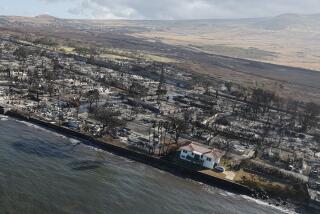Philippines Completes Iraq Pullout
The Philippines withdrew the last of its forces from Iraq on Monday in a move that has shored up support for President Gloria Macapagal Arroyo among the country’s poor but harmed her government’s reputation abroad.
The Philippines met a Tuesday deadline set by kidnappers who threatened to behead a Philippine truck driver if Manila did not pull out its troops. Arroyo, hoping to secure the release of the hostage, Angelo de la Cruz, abandoned her commitment to keep a small contingent in Iraq until Aug. 20.
The last of the Philippine soldiers crossed into Kuwait by truck late Monday, but there was no word on the fate of De la Cruz, who was kidnapped near Fallouja this month while ferrying supplies from Saudi Arabia.
Manila’s decision to retreat has been criticized by the U.S., Australia and the interim government of Iraq. But it was a joke by “Tonight Show” host Jay Leno that struck a nerve with the Arroyo government.
“A new world record has been set in the 100-meter dash,” Leno quipped last week. “It was set by Filipino troops fleeing Iraq.”
The show, which was broadcast in the Philippines, prompted presidential spokesman Ignacio Bunye to comment on the withdrawal after days of official silence about the hostage crisis. He said the Philippines should not be accused of cowardice given the country’s history of valor in World War II.
“We have proven our courage and bravery in Bataan and Corregidor and every other battlefield where we fought,” he said in a radio interview. “All we can say at this point is that we are upholding the national interest of the Philippines.”
The Philippines is not the first nation to recall its forces. After the Madrid train bombings in March, Spain withdrew its 1,300 troops. Honduras and the Dominican Republic pulled out smaller contingents.
The De la Cruz crisis has been one of Arroyo’s toughest tests since 2001 when, as vice president, she assumed office with the ouster of President Joseph Estrada. Many of Estrada’s supporters -- poor workers like De la Cruz -- have never accepted her legitimacy as president.
If Arroyo permitted De la Cruz to be beheaded, she faced the possibility of street protests that could topple her presidency just over a month after she was elected to her first full term.
The kidnapping of De la Cruz, 46, quickly made the father of eight a symbol of the ordinary Filipino’s struggle for survival. His name means “Angel of the Cross,” and he is one of about 8 million Filipinos -- 10% of the population of the predominantly Catholic country -- who work overseas and send money home to their families. The contributions bring in far more revenue than does foreign aid. About 4,000 Philippine contract workers remain in Iraq.
Arroyo had been widely perceived as doing the bidding of the United States, particularly in sending the contingent of 51 soldiers and police to Iraq, a force later reduced to 43.
Many Filipinos view the war in Iraq as President Bush’s war. And after De la Cruz was kidnapped, they did not see the point of keeping the force in Iraq until August when bringing the troops home a month earlier could save the truck driver’s life.
“Pulling out the contingent to save De la Cruz is the right thing to do,” the Malaya newspaper, a frequent Arroyo critic, said in an editorial Monday. “We have no business being in Iraq. We have to take care of our citizens driven by economic necessity to work in foreign lands. De la Cruz is the living symbol of these millions of our countrymen.”
Officials in Washington criticized Arroyo for sending the “wrong signal” to terrorists, but U.S. Ambassador to the Philippines Francis Ricciardone acknowledged her dilemma.
“It is a tough crisis, and leaders are called upon in a crisis to do hard things, and she has stood up, and she’s shown deep, deep care for this hostage, but also care for the country’s longer-term interests,” he said.
De la Cruz’s family lives in a village north of Manila in a one-room bamboo hut with a dirt floor. The hut has no running water, and the family sleeps on woven grass mats. Relatives say De la Cruz went to Iraq to earn enough money to pay for eye surgery for his son.
Since De la Cruz was kidnapped, donors have promised the family a concrete house, scholarships for all eight children and eye surgery for the son.
“We all love Angelo,” said Bunye, the presidential spokesman. “He has become the Filipino everyman.”
But some argue that giving in to terrorists in Iraq will complicate matters for the Philippines. The country has suffered dozens of kidnappings -- including many foreigners -- in its troubled southern region. The extremist Abu Sayyaf group beheaded an American tourist, Guillermo Sobero of Corona, Calif., in 2001, and several Christian villagers.
Interim Iraqi Prime Minister Iyad Allawi argued that it was wrong to negotiate with terrorists and phoned Arroyo directly to urge her to keep her troops in Iraq. Some domestic critics warn that the next time Manila seeks international help to deal with terrorists on its soil, assistance might not be quick to arrive.
“We must be prepared to fight our own battles, because like it or not, after abandoning allies in the middle of a fight, when we send out an SOS, help can only come with great reluctance,” the Philippine Star newspaper said Monday. “We turned tail in the face of terror, no ifs or buts about it, and that will haunt the nation for a long time.”
More to Read
Start your day right
Sign up for Essential California for news, features and recommendations from the L.A. Times and beyond in your inbox six days a week.
You may occasionally receive promotional content from the Los Angeles Times.






